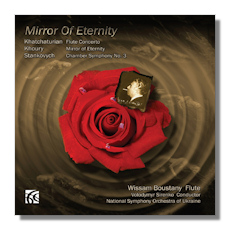
The Internet's Premier Classical Music Source
Related Links
- Khachaturian Reviews
- Latest Reviews
- More Reviews
-
By Composer
-
Collections
DVD & Blu-ray
Books
Concert Reviews
Articles/Interviews
Software
Audio
Search Amazon
Recommended Links
Site News
 CD Review
CD Review
Mirror of Eternity

- Aram Khachaturian: Flute Concerto
- Houtaf Khoury: Mirror of Eternity
- Evgeny Stankovych: Chamber Symphony #3
Wissam Boustany, flute
National Symphony Orchestra of the Ukraine/Vladimir Sirenko
Nimbus Alliance NI6168 80min
The greater portion of this music has been inspired, shaped or influenced by the spirit of tension and anxiety that has prevailed in many parts of the world, a spirit that finds its seeds in the consequences of oppression, injustice and war. While these diverse works came from Armenia, Lebanon and Ukraine, they most certainly transcend their geographical boundaries, and speak to us with a language of defiance that stirs both our spirit and conscience. Militarism and violence turn up in different guises, but the results are always the same: hatred, destruction and death on a universal scale. Indeed, we are living in an age where those who pose as leaders and liberators are themselves prime examples of corruption and hypocrisy in full "glory". Faced with this phalanx of human fallacy one can only respond by trying to expose and deal with the darkness that lies within and consequently reveal the light that lives within us. Both these realities are represented most powerfully in the music featured on this programme.
Aram Khachaturian's love of Armenian, Azerbaijani and Georgian folklore is at the root of his musical philosophy, and the flute concerto, which was originally written for violin in 1940, is a "tour-de-force' of folkloric melody and dance that moves irresistibly forward with a sustained developing momentum. Houtaf Khoury's "Mirror of Eternity' is also a concerto for flute, and is dedicated to the soloist on this recording. Reflecting life in the Arab world, where society remains closed and entrenched, it reflects a person who is shaped by the characteristics of this unique cultural environment that is somehow trying to free itself from this claustrophobic entrapment. The Chamber Symphony #3 by Yevhen Stankovych is a stark and obsessive work, using a very small nucleus of highly defined ideas to create a structure of awesome power and emotional depth. As the piece develops one cannot fail to experience a certain sense of foreboding, gloom and despair, although sudden moments of visionary peace do appear from time to time. The end is enigmatic, leaving the listener to make his own conclusion.
Although in general this is a meaty programme, Khachaturian's Concerto blends splendidly with the more austere stuff, and for those who enjoy a mind-stimulating exercise, this disc is the perfect vehicle. Wonderfully passionate performances, especially from the soloist, make a very strong case for all three creations, and each composer is given an unflinching advocacy from start to finish. A challenging issue which should serve not only as a musical stimulus but also as a harsh reminder that humankind is still a way off from achieving true human dignity. Notes are lean, but sound quality is first-rate.
Copyright © 2012, Gerald Fenech





















